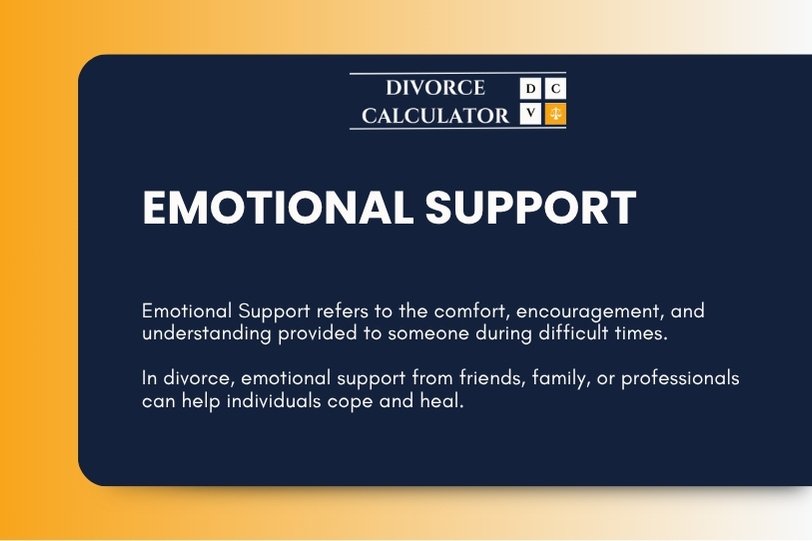Emotional support is a fundamental part of our well-being, especially during challenging times. It involves providing understanding, empathy, and encouragement to help us navigate stress, uncertainty, or sadness. This support can come from friends, family, coworkers, or even professional counselors.
When we receive emotional support, we are more likely to cope effectively with challenges and maintain our mental health. Knowing how to give and receive emotional support can make a significant difference in our relationships and everyday lives. Understanding its importance helps us foster stronger connections and improve our collective resilience.
Key Takeaways
- Emotional support involves actively listening, showing empathy, and fostering trust.
- Effective support helps reduce feelings of isolation for those experiencing stress or hardship.
We need to remember that emotional support is not about offering solutions. Our main goal is to provide understanding and validation.
Not everyone responds to support in the same way. It’s important that we tailor our approach based on individual needs and preferences.
Core Elements of Emotional Support:
| Element | Description |
|---|---|
| Empathy | Understanding and sharing feelings |
| Active Listening | Focusing fully on the speaker |
| Nonjudgmental Attitude | Accepting others without criticism |
| Availability | Being present both physically and emotionally |
We may see positive impacts on mental health when we consistently offer emotional support. These include better resilience and improved relationships.
Simple gestures, such as asking open-ended questions or offering a listening ear, can make a significant difference.
We must be mindful to avoid minimizing others’ emotions or giving unsolicited advice. Instead, we focus on being present and responsive.

Why Emotional Support Matters In Divorce
When we go through a divorce, emotional challenges can affect nearly every aspect of our lives. Stress, uncertainty, and grief often make it harder to manage day-to-day responsibilities.
Emotional support helps us process feelings and prevents isolation. This support can come from family, friends, or professional counselors. Knowing someone is there to listen makes difficult moments more manageable.
We may also experience changes in relationships and routines. Children, if present, can feel the effects and may need additional support. Open conversations and reassurance become more important during this period.
Typical emotional support sources include:
- Therapy and counseling
- Support groups
- Trusted friends or family
| Support Type | Benefit |
|---|---|
| Professional therapy | Guidance through complex emotions |
| Family & friends | Immediate comfort and understanding |
| Support groups | Shared experiences and advice |
By seeking and accepting emotional support during divorce, we give ourselves tools to cope and adapt. This support helps us recover and begin moving forward.
Real-Life Examples
One way we see emotional support in action is at workplaces where colleagues check in on each other’s well-being. For example, team members might offer a listening ear during stressful periods or share resources when someone faces challenges.
Family settings provide another clear example. When a family member goes through a difficult time, we often comfort them with kind words, reassurance, or simply our presence. These gestures help maintain a sense of connection and trust.
We also observe emotional support in schools and universities. Peer support groups, counseling services, and mentorship programs allow students to express concerns and receive guidance. This encourages a healthy environment for learning and personal growth.
Common Types of Emotional Support:
- Active listening
- Giving constructive feedback
- Validating feelings
- Offering companionship
| Setting | Example |
|---|---|
| Workplace | Checking in with colleagues |
| Family | Reassuring a relative after bad news |
| Educational | Peer mentoring and counseling sessions |
Through these examples, it’s clear that emotional support can take many forms in our daily interactions. Simple actions, like offering a sympathetic ear or a word of encouragement, can make a measurable difference.
How States Handle Emotional Support
States differ in how they define, recognize, and regulate emotional support services, especially around housing, transportation, and legal rights. We see distinct rules and agency guidance depending on local priorities and legislation.
New York
In New York, emotional support animal (ESA) accommodation is managed under both federal law and specific state regulations. Landlords are typically required to consider reasonable ESA accommodation requests under the New York State Human Rights Law.
We must provide valid documentation from a licensed healthcare professional when requesting ESA status in housing. Airlines operating in New York follow federal guidelines, generally not allowing ESAs in cabins but making exceptions for psychiatric service animals.
Key Points:
- Housing providers may not charge extra pet fees for ESAs.
- Tenants can file complaints with the New York Division of Human Rights if rights are denied.
- False documentation submissions carry penalties.
California
California has some of the most comprehensive ESA protections. The Fair Employment and Housing Act (FEHA) and the Unruh Civil Rights Act strengthen federal regulations, offering broad coverage for residential settings.
We must supply a letter from a licensed mental health professional when seeking ESA accommodation. The law applies to most housing, including “no pet” residences, but doesn’t extend to ESAs on flights. Fraudulent ESA claims are explicitly prohibited and may result in fines.
Main Features:
- Landlords can’t charge pet deposits or increased rent for verified ESAs.
- Businesses open to the public generally only admit service animals, not ESAs.
- Housing discrimination claims go through the California Civil Rights Department.
Texas
Texas aligns with federal housing rules concerning ESAs but provides limited additional state-specific guidance. ESAs must be allowed in housing covered by the Fair Housing Act, with proper documentation from a licensed health provider.
State law specifically prohibits misrepresenting pets as assistance animals. We may face civil penalties up to $1,000 for each violation. Airlines do not have to accept ESAs, following the federal standard.
Notable Details:
- Property owners can verify an ESA’s necessity but cannot ask for details about our conditions.
- Pet fees and deposits cannot be collected for ESAs in housing.
- Public spaces like restaurants are not required to admit ESAs.
Florida
Florida enforces robust rules addressing both ESA protections and fraud prevention. Landlords must make reasonable accommodations for ESAs in housing, provided we offer appropriate documentation, often in the form of a written recommendation from a healthcare provider.
The law makes it a second-degree misdemeanor to submit false ESA documentation. Florida statutes also clarify that ESAs are not covered by public accommodation laws—their access is limited to housing.
Key Information:
- ESAs are exempt from pet fees in housing but not hotels or public venues.
- State law clearly defines documentation requirements and penalties for misrepresentation.
- Complaints are handled by the Florida Commission on Human Relations, which investigates discrimination or denial cases.
Tips If You’re Dealing With Emotional Support
When we provide or receive emotional support, clear communication matters. Let’s be open about our needs and boundaries so we understand each other better.
Active listening is essential. We should try to listen without interrupting and show that we’re paying attention by nodding, making eye contact, or simply acknowledging the other person’s feelings.
It helps to avoid judgment. We must remember that validating feelings doesn’t mean we have to agree, but it’s important to acknowledge emotions without criticizing.
Let’s consider practical ways to offer support:
- Ask how we can help, rather than guessing.
- Use encouraging words, like “I’m here for you,” or “It’s okay to feel this way.”
- Offer a listening ear, not necessarily solutions.
| Things to Do | Things to Avoid |
|---|---|
| Practice patience | Offering unsolicited advice |
| Maintain confidentiality | Minimizing someone’s feelings |
| Follow up regularly | Making assumptions about their needs |
If supporting others feels overwhelming, we should seek guidance. Reaching out to a mental health professional can provide us with strategies for both giving and receiving effective support.
Frequently Asked Questions
Understanding how to both offer and seek emotional support allows us to build healthier relationships and maintain mental well-being. We benefit from recognizing practical ways to communicate, give comfort, and support each other emotionally.
What are effective ways to provide emotional support within a relationship?
We can listen actively without interrupting, validate one another’s feelings, and express empathy. Simple acts like checking in regularly, offering words of encouragement, or spending quality time together make a difference.
We should avoid judgment and instead create a safe space where concerns can be shared openly.
How can one ask for emotional support when needed?
We can express our needs directly and honestly. For example, saying “I feel overwhelmed and could use someone to talk to” helps others understand how to support us.
It also helps to specify the kind of support we’re seeking—whether it’s advice, a listening ear, or just reassurance.
What are some common examples of verbal and non-verbal emotional support?
Verbal support includes statements like “I’m here for you,” “That sounds difficult,” or “I appreciate you sharing this with me.” Non-verbal support involves actions such as offering a hug, making eye contact, or simply sitting quietly with someone while they talk.
Even a gentle pat on the back or a reassuring nod can convey empathy.
How can adults ensure they are receiving sufficient emotional support?
We can regularly check in with ourselves about our emotional needs and communicate those needs to trusted friends, partners, or professionals. Seeking support groups or counseling can provide additional resources.
Maintaining healthy boundaries and surrounding ourselves with people who respect our feelings is also essential.
What role do emotional support animals play in mental well-being?
Emotional support animals can help reduce stress, anxiety, and feelings of loneliness. We benefit from their companionship, which often provides comfort during difficult times.
Their presence can help us feel calmer and more secure, especially during periods of emotional distress.
Can quotes and affirmations be considered forms of emotional support, and how are they used?
Yes, quotes and affirmations can serve as reminders of strength, hope, or personal values. We often use them by reading or repeating them during challenging moments to boost our resilience.
Displaying affirmations where we can see them daily helps encourage a positive mindset.



